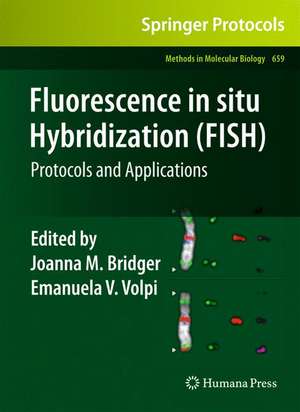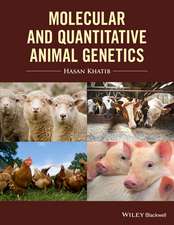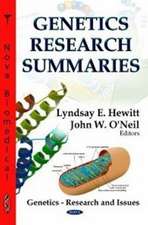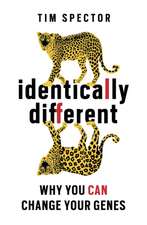Fluorescence in situ Hybridization (FISH): Protocols and Applications: Methods in Molecular Biology, cartea 659
Editat de Joanna M. Bridger, Keith Morrisen Limba Engleză Hardback – 9 sep 2010
| Toate formatele și edițiile | Preț | Express |
|---|---|---|
| Paperback (1) | 710.75 lei 6-8 săpt. | |
| Humana Press Inc. – 23 aug 2016 | 710.75 lei 6-8 săpt. | |
| Hardback (1) | 964.71 lei 6-8 săpt. | |
| Humana Press Inc. – 9 sep 2010 | 964.71 lei 6-8 săpt. |
Din seria Methods in Molecular Biology
- 9%
 Preț: 791.63 lei
Preț: 791.63 lei - 23%
 Preț: 598.58 lei
Preț: 598.58 lei - 20%
 Preț: 882.98 lei
Preț: 882.98 lei -
 Preț: 252.05 lei
Preț: 252.05 lei - 5%
 Preț: 802.70 lei
Preț: 802.70 lei - 5%
 Preț: 729.61 lei
Preț: 729.61 lei - 5%
 Preț: 731.43 lei
Preț: 731.43 lei - 5%
 Preț: 741.30 lei
Preț: 741.30 lei - 5%
 Preț: 747.16 lei
Preț: 747.16 lei - 15%
 Preț: 663.45 lei
Preț: 663.45 lei - 18%
 Preț: 1025.34 lei
Preț: 1025.34 lei - 5%
 Preț: 734.57 lei
Preț: 734.57 lei - 18%
 Preț: 914.20 lei
Preț: 914.20 lei - 15%
 Preț: 664.61 lei
Preț: 664.61 lei - 15%
 Preț: 654.12 lei
Preț: 654.12 lei - 18%
 Preț: 1414.74 lei
Preț: 1414.74 lei - 5%
 Preț: 742.60 lei
Preț: 742.60 lei - 20%
 Preț: 821.65 lei
Preț: 821.65 lei - 18%
 Preț: 972.30 lei
Preț: 972.30 lei - 15%
 Preț: 660.49 lei
Preț: 660.49 lei - 5%
 Preț: 738.41 lei
Preț: 738.41 lei - 18%
 Preț: 984.92 lei
Preț: 984.92 lei - 5%
 Preț: 733.29 lei
Preț: 733.29 lei -
 Preț: 392.60 lei
Preț: 392.60 lei - 5%
 Preț: 746.26 lei
Preț: 746.26 lei - 18%
 Preț: 962.66 lei
Preț: 962.66 lei - 23%
 Preț: 860.22 lei
Preț: 860.22 lei - 15%
 Preț: 652.64 lei
Preț: 652.64 lei - 5%
 Preț: 1055.50 lei
Preț: 1055.50 lei - 23%
 Preț: 883.87 lei
Preț: 883.87 lei - 19%
 Preț: 491.89 lei
Preț: 491.89 lei - 5%
 Preț: 1038.86 lei
Preț: 1038.86 lei - 5%
 Preț: 524.16 lei
Preț: 524.16 lei - 18%
 Preț: 2122.34 lei
Preț: 2122.34 lei - 5%
 Preț: 1299.23 lei
Preț: 1299.23 lei - 5%
 Preț: 1339.12 lei
Preț: 1339.12 lei - 18%
 Preț: 1390.26 lei
Preț: 1390.26 lei - 18%
 Preț: 1395.63 lei
Preț: 1395.63 lei - 18%
 Preț: 1129.65 lei
Preț: 1129.65 lei - 18%
 Preț: 1408.26 lei
Preț: 1408.26 lei - 18%
 Preț: 1124.92 lei
Preț: 1124.92 lei - 18%
 Preț: 966.27 lei
Preț: 966.27 lei - 5%
 Preț: 1299.99 lei
Preț: 1299.99 lei - 5%
 Preț: 1108.51 lei
Preț: 1108.51 lei - 5%
 Preț: 983.76 lei
Preț: 983.76 lei - 5%
 Preț: 728.16 lei
Preț: 728.16 lei - 18%
 Preț: 1118.62 lei
Preț: 1118.62 lei - 18%
 Preț: 955.25 lei
Preț: 955.25 lei - 5%
 Preț: 1035.62 lei
Preț: 1035.62 lei - 18%
 Preț: 1400.35 lei
Preț: 1400.35 lei
Preț: 964.71 lei
Preț vechi: 1176.47 lei
-18% Nou
Puncte Express: 1447
Preț estimativ în valută:
184.62€ • 192.03$ • 152.41£
184.62€ • 192.03$ • 152.41£
Carte tipărită la comandă
Livrare economică 14-28 aprilie
Preluare comenzi: 021 569.72.76
Specificații
ISBN-13: 9781607617884
ISBN-10: 1607617889
Pagini: 410
Ilustrații: XIV, 451 p.
Dimensiuni: 178 x 254 x 35 mm
Greutate: 1 kg
Ediția:2010
Editura: Humana Press Inc.
Colecția Humana
Seria Methods in Molecular Biology
Locul publicării:Totowa, NJ, United States
ISBN-10: 1607617889
Pagini: 410
Ilustrații: XIV, 451 p.
Dimensiuni: 178 x 254 x 35 mm
Greutate: 1 kg
Ediția:2010
Editura: Humana Press Inc.
Colecția Humana
Seria Methods in Molecular Biology
Locul publicării:Totowa, NJ, United States
Public țintă
Professional/practitionerCuprins
Core Techniques.- Fluorescence in situ Hybridization (FISH), Basic Principles and Methodology.- Fluorescence In Situ Hybridization on DNA Halo Preparations and Extended Chromatin Fibres.- Detection of Nascent RNA Transcripts by Fluorescence In Situ Hybridization.- Fluorescence In Situ Hybridization Analysis of Formalin Fixed Paraffin Embedded Tissues, Including Tissue Microarrays.- Fluorescence in situ Hybridization (FISH) on Tissue Cryosections.- Multiplex Fluorescence in situ Hybridization (M-FISH).- Optical Mapping of Protein–DNA Complexes on Chromatin Fibers.- 3D-FISH on Cultured Cells Combined with Immunostaining.- Technical Advancements and Novel Adaptations.- The Comet-FISH Assay for the Analysis of DNA Damage and Repair.- Direct In Situ Hybridization with Oligonucleotide Functionalized Quantum Dot Probes.- LNA-FISH for Detection of MicroRNAs in Frozen Sections.- Chromosome Orientation Fluorescence In Situ Hybridization or Strand-Specific FISH.- Combinatorial Oligo FISH: Directed Labeling of Specific Genome Domains in Differentially Fixed Cell Material and Live Cells.- Simultaneous Visualization of FISH Signals and Bromo-deoxyuridine Incorporation by Formamide-Free DNA Denaturation.- CryoFISH: Fluorescence In Situ Hybridization on Ultrathin Cryosections.- Characterization of Chromosomal Rearrangements Using Multicolor-Banding (MCB/m-band).- Visualizing Nucleic Acids in Living Cells by Fluorescence In Vivo Hybridization.- Translational FISH: Applications for Human Genetics and Medicine.- Quality Control in FISH as Part of a Laboratory’s Quality Management System.- FlashFISH: “Same Day” Prenatal Diagnosis of Common Chromosomal Aneuploidies.- FISH for Pre-implantation Genetic Diagnosis.- PNA–FISH on Human Sperm.- POD-FISH: A New Technique for ParentalOrigin Determination Based on Copy Number Variation Polymorphism.- Sequence-Based High Resolution Chromosomal Comparative Genomic Hybridization (CGH).- ImmunoFISH on Isolated Nuclei from Paraffin-Embedded Biopsy Material.- Fluorescence In Situ Hybridization on 3D Cultures of Tumor Cells.- Simultaneous Ultrasensitive Subpopulation Staining/Hybridization In Situ (SUSHI) in HIV-1 Disease Monitoring.- Protocols for Model Organisms.- Detection of Prokaryotic Cells with Fluorescence In Situ Hybridization.- FISH as a Tool to Investigate Chromosome Behavior in Budding Yeast.- FISH on Chromosomes Derived from the Snail Model Organism Biomphalaria glabrata.- Fluorescence in situ Hybridization with Bacterial Artificial Chromosomes (BACs) to Mitotic Heterochromatin of Drosophila.- Three-Dimensional Fluorescence In Situ Hybridization in Mouse Embryos Using Repetitive Probe Sequences.- Fluorescence in situ Hybridization (FISH) for Genomic Investigations in Rat.- Fluorescence In Situ Hybridization on Early Porcine Embryos.- FISH on 3D Preserved Bovine and Murine Preimplantation Embryos.
Recenzii
From the reviews:
“Fluorescence in situ hybridization (FISH) has been widely adopted to enable the study of uncultured target cells. This book shows many more applications in cytology. Relatively few chapters are devoted directly to microbiological applications; the strong theme of the book describes methods targeting chromosomes. … Protocols on 3-D FISH may have useful material for microbiologists, e.g. studies on biofilms. … I would suggest this is for microbiological libraries … .” (Jonathan Porter, Microbiology Today, November, 2011)
“Fluorescence in situ hybridization (FISH) has been widely adopted to enable the study of uncultured target cells. This book shows many more applications in cytology. Relatively few chapters are devoted directly to microbiological applications; the strong theme of the book describes methods targeting chromosomes. … Protocols on 3-D FISH may have useful material for microbiologists, e.g. studies on biofilms. … I would suggest this is for microbiological libraries … .” (Jonathan Porter, Microbiology Today, November, 2011)
Textul de pe ultima copertă
The design simplicity and cost-effectiveness of the early Fluorescence in situ Hybridization (FISH) protocols, combined with the significant acceleration of discoveries in related technical areas like fluorescence microscopy, digital imaging, and nucleic acid technology have prompted the diversification of the original technique into an outstanding number of imaginative and useful applications, thus promoting its expansion into different areas of basic and applied research in the post-genomic era. In Fluorescence in situ Hybridization (FISH): Protocols and Applications, experts in the field portray the vibrant complexity and diversity of the current FISH protocol landscape, providing cutting-edge examples of various applications for genetic and developmental research, cancer research, reproductive medicine, diagnostic and prognostic purposes, microbial ecology and evolutionary studies. The book is divided into four convenient sections covering the core techniques, technical advancements and novel adaptations, applications for human genetics and medicine, as well as protocols for model organisms. Written in the highly successful Methods in Molecular Biology™ series format, chapters include introductions to their respective chapters, lists of the necessary materials and reagents, step-by-step, readily reproducible laboratory protocols, and notes highlighting tips on troubleshooting and avoiding known pitfalls.Comprehensive and up-to-date, Fluorescence in situ Hybridization (FISH): Protocols and Applications aims to aid scientists from across the world in applying this tried-and-true scientific technique to their own lab’s current research.
Caracteristici
Contains a plethora of modern adaptations to the FISH methodology Of great use to both clinical and research laboratories Will inform how to achieve and recognize quality in the different FISH methodologies Includes supplementary material: sn.pub/extras











